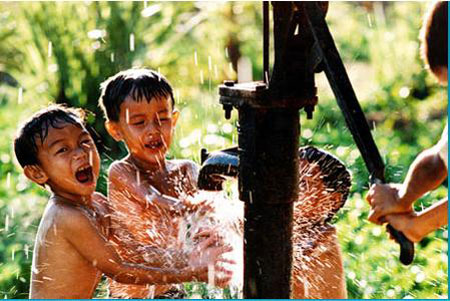VN works on rural clean water and environmental hygiene
VGP - Clean water and environmental hygiene affect life of every citizen and the existence and development of each country and region. A movement on the protection of the environment and water sources has been responded enthusiastically across Vietnam.
 |
Clean water has been accessible to households in many areas, helping improve locals’ living conditions. In 2011, 78% of the population had access to clean water for daily use and 37% of them use hygiene water set by the Ministry of Health; 55% of households had hygienic toilets, more than 80% of schools and clinics had water supply and hygienic toilets.
In addition, sanitation in the environment and breeding facilities has been improved, contributing to build modern and civilized rural areas.
However, there remain difficulties in remote and mountainous areas. Underground water sources are polluted due to human activities such as untreated garbage and wastewater. Excessive exploitation including drilling for construction and mining have destroyed the protection rock layer and speeded up salinity intrusion. The ultimate consequence is rising malnutrition and diseases.
To cope with the situation, the Prime Minister has approved the National Target Program for rural clean water and sanitation during 2012-2015 period. The program is significant in realizing the National Strategy for rural clean water and sanitation by 2020.
The program has a total investment of VND 27,600 billion for three projects namely a project on water supply for daily use and environment in rural areas, a project on rural sanitation and a project on capacity building for communications, supervisions and assessment of the program.
The overall goal of the program is to improve conditions for water supply and sanitation, raise awareness and change behavior, minimize environmental pollution and contribute to rural people’s health care and quality of life.
The program aims to provide clean water to 85% of rural population and 100% of communal kindergartens, schools and clinics. 65% of rural households will have decent toilets, 45% of farmers will have hygienic breeding facilities and 100% of communal kindergartens, schools and clinics will have hygienic toilets.
The program sets out major measures relating to specific mechanism and policies, information, education and communications, international cooperation, post-investment management, human resource development, science, technology and community’s involvement.
The National Target Program for rural clean water and sanitation during 2012-2015 period is one of the 16 National Target Programs during 2012-2015 period.
By Ngoc Van

